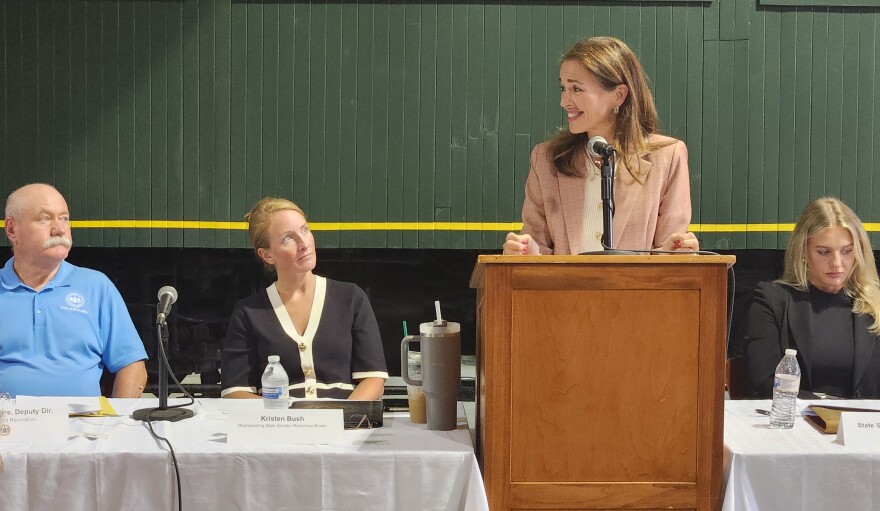Lackawanna County has made great progress in the 35 years since the Americans with Disabilities Act became law. And the region still has work to do to make it more accessible for all, leaders, advocates and community members said Thursday.
With uncertainty about state funding and fear of federal cuts on the minds of many, the county’s Disability Action Committee held a town hall at the Electric City Trolley Museum.

“This is the first of our events for something like this. I'm really happy with the turnout,” said Keith Williams, chair of the committee and manager of OVR grant and advocacy at the Center for Independent Living in Scranton. “We have a lot of bipartisan support, because disability is a non-partisan issue.”
Commissioners Chris Chermak and Bill Gaughan said the gathering showed the county’s commitment to fostering an inclusive community.
The Americans with Disabilities Act prohibits discrimination against individuals with disabilities in many areas of public life, including jobs, schools and transportation, along with public and private places that are open to the general public.
“While the law opened doors, we know that too many remain closed, literally and figuratively,” Gaughan said. “Elevators have never arrived. Waiting lists for services that stretch into years, entrances that exclude and systems that silence… We are here today to change that, not just to name the barriers, but to challenge them, not just to describe the problems, but to create solutions together. This town hall today is about the truth.”
Accessibility progress in NEPA
From city and county parks where children of all abilities can play together, to accessible sidewalks, curbs and public transportation — the entire region benefits from inclusion, officials said.
“I also think there is the collective recognition — and perhaps this is even more important — that our work to make our communities more inclusive, compassionate, accessible is far from finished,” said state Rep. Kyle Mullins, who represents part of the county.
Mullins saw the accessibility gaps that remained as his father was diagnosed and declined from Amyotrophic Lateral Sclerosis (ALS), often referred to as Lou Gehrig’s disease.
“This is our charge, this is our responsibility as public officials,” he said.

Impact of the Americans with Disabilities Act
Town hall participants filled the room at the Electric City Trolley Museum — which speakers called a fitting location, dedicated to the progress of the past, to talk about progress for the future.
“We’re coming together to build bridges today,” said Dale Verchick, director of public policy for Disability Rights Pennsylvania and the event’s keynote speaker.
Verchick named many examples of the impact of the ADA, from allowing service animals in public places to reading closed captioning on live television, to having thousands of people able to move out of institutions and into homes and communities.
“We want to preserve the rights of folks with intellectual and mental health disabilities to stay in their homes with the right supports,” she said. “We want to stabilize funding for accessible transit across Pennsylvania, and we want to safeguard continuous Medicaid coverage.”

More accessibility, funding needed
Those in attendance called for better curb cuts, more employment opportunities and accessible restrooms at large retailers. They also talked about the need for continued financial support of public transportation.
Lackawanna County’s Shared Ride program — which Williams said is how he gets to and from work — provides 500 rides daily and more than 126,000 trips annually. It also operates at a deficit of $1 million per year, said Tim McGrath, executive director of the County of Lackawanna Transit System.
“The good news is, folks here that you see at this table… are trying to lead the charge that something has to be done with this program,” McGrath said. “Compensation rates aren't where they need to be.”
Concerns with federal, state funding
Concerns about state and federal funding bring great anxiety to those who rely on support, including Williams.
Williams, who was present at the White House during the signing of the ADA 35 years ago, was born with Arthrogryposis Multiplex Congenita — a neuromuscular disability — and uses a wheelchair.
Advocates worry about what the federal One Big Beautiful Bill Act, signed by President Donald Trump on July 4, will do for people with disabilities. The bill cuts federal health spending by about $1 trillion over a decade.
The Trump Administration says those with disabilities will see no change in coverage.
Those with disabilities also worry about the potential impact on home and community-based services, which enable individuals to live in their homes or communities rather than in institutions such as nursing homes.
“So much good work has been done, but at the same time, so much of that is now jeopardized by Medicaid cuts,” Williams said.
He worries that cuts could keep people from having the help they need to physically get out of bed in the morning.
“You can have all the accessible facilities in the world. They don't mean anything if you can't get out to them,” he said.
Funding levels for state programs are still unknown, a month after the state Legislature missed its deadline to pass a 2025-26 budget.

The state House, controlled by Democrats, passed a spending bill in July. Republicans control the Senate and say they are concerned about the level of spending proposed by Gov. Josh Shapiro.
State Rep. Jim Haddock, who represents part of Lackawanna and Luzerne counties, expressed his frustrations.
“In Pennsylvania, we're trying to do more for our friends on Medicaid and Medicare. Unfortunately, in Washington, it's under attack. It's terrible,” he said. “What's going on in Harrisburg today is a fight over money. The budget should have been done on June 30. We just wasted the month of July fighting the budget.”


